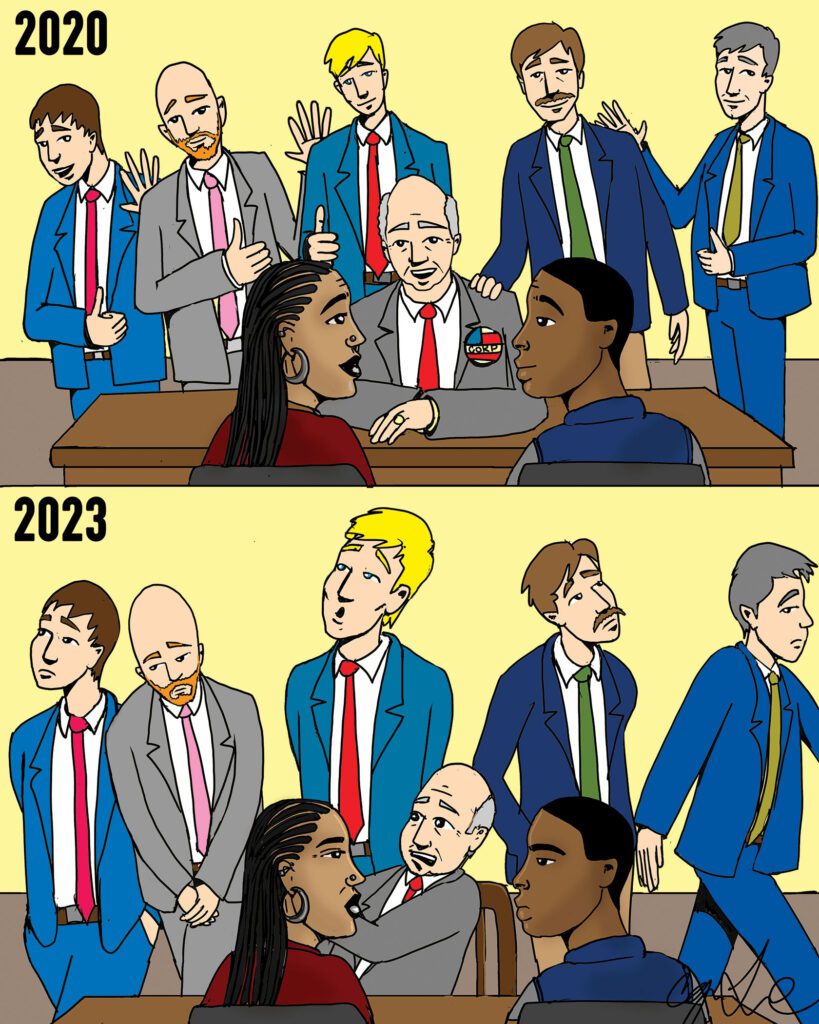
After the murder of George Floyd and the unprecedented protests against police brutality and systemic racism, many corporations recognized that they could no longer stand silent and would take an active role in confronting the overarching problem through diversity, equity and inclusion, or DEI, initiatives. The main way corporations can assist is by hiring more people of color. But as the massive protests of 2020 have subsided, a swift political backlash has emerged against targeted initiatives to uplift people of color. Politicians on the right have enacted laws in some states to try to erase African Americans from history and their struggle for civil rights, the historical foundation of DEI efforts.
That is why the Banner partnered with Ted Landsmark, director of Northeastern University’s Dukakis Center for Urban and Regional Policy, to check up on how large companies in Massachusetts, which generally already had DEI commitments even before the protests, were doing.
This being Native American history month, we must remember the history of broken promises and treaties between the U.S. government and Native nations to know how important it is to keep those in power accountable for their stated commitments. American Indians developed a phrase to describe officials who broke promises as “speaking with a forked tongue.”
As the Banner discovered, out of the 17 companies in Massachusetts that allowed the federal government to release their employment data, only three exceeded the proportional representation of Blacks and Hispanics in the state. In 2020, they made up 31% of the Massachusetts population. Most companies fell well below that, with 14% being the median. All 17 companies are federal contractors bound by an executive order to take “affirmative action” to diversify the ranks of their employees.
At the three companies that performed better than the state proportional representation of 31%, the employment levels for Blacks and Hispanics combined was 40%, 45% and 47%. Two, Bright Star Senior Living and Bright Horizons Family Solutions, are in the human service sector, which primarily provides lower-compensated jobs with fewer paths for advancement. The other, Iron Mountain Inc., is a tech company that stores data and manages information.
If we ever want to make strides in closing the gap in generational wealth in Massachusetts, the job opportunities in biotech, med-tech and technology is where we need to see advancement. Unfortunately, such companies that we were able to include in the analysis by the Banner and Northeastern had low levels of Black and Hispanic employment: Moderna, 10%; Boston Scientific, 14%; and Biogen, 17%. Advanced technological companies as a group fared worse: Johnson Controls, 6%; Analog Devices, 7%, and Hologic, 12%.
Scientific and engineering jobs, including those in leadership positions on corporate boards, are the type of jobs that lead to home ownership and contribute to building generational wealth. The local racial gap was highlighted in a Boston Globe Spotlight Team investigation in 2017. It noted that a Boston Federal Reserve Bank study in 2015 found the median net worth for white households in greater Boston was about $250,000 dollars, but for Black households, it was just $8 dollars. This disparity cannot stand, and companies must be held accountable for keeping their promises made in the last year of our analysis, 2020.
Change is possible if DEI becomes a priority in boardrooms and an integral part of a corporation’s values. During about the same period of our analysis, 2016-2020, there was a significant boost in female representation on biopharma boards. In a MassBio report published in 2021, respondents reported women comprised 37% of their boards, a 164% increase from the dismal 14% in a 2017 survey.
What is clear is that corporate America can make important strides to be more inclusive in their recruitment and hiring of people of color. It is also clear that we must hold those corporations accountable for their stated commitments, or else they will never be fulfilled. For starters, the two dozen companies that blocked the U.S. Department of Labor from releasing their employment data need to do so on their own, voluntarily, without a Freedom of Information Act request. Having made public commitments, why are they hiding behind an exemption for confidentiality? The Banner will continue to watch and report the truth.







